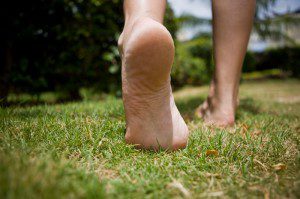By Dr. Christopher Addison, DPM –


Every diabetic wants to lower their chances of getting foot problems that can lead to the complications associated with the diabetic foot. Rob Law is no exception to this. Being a diabetic himself, Rob expresses that the most important thing you can do to prevent serious problems and amputation is to take proper care of your feet. Even if you have had diabetes for a long time, Cortez Foot and Ankle Specialists can help you learn more about preventing problems and design an individualized plan for taking care of your feet.
Rob’s first visit to Cortez Foot and Ankle Specialists was a little more than two years ago when he had an ingrown toenail that had become very painful. Dr. Addison discovered that the recurring problem required more than simply cutting the ingrown toenail. Rob had to have surgery, but excitedly exclaimed that he hasn’t had an ingrown toenail since the procedure. As most diabetics know, Rob understands that any issues with his feet should be taken care of immediately and that regular foot examinations are the key to preventing serious problems.
Why is Foot Care Important?
Over time, diabetes can cause you to lose feeling in your feet. When you lose feeling in your feet, you may not feel a pebble inside your sock or a blister on your foot, which can lead to cuts, sores and infections. Diabetes also can lower the amount of blood flow in your feet. Numbness and diminished blood flow in the feet results in various foot problems.
Regular and proper foot care is very important for all people with diabetes, especially if you have:
• pain or loss of feeling in your feet (numbness, tingling)
• changes in the shape of your feet or toes
• sores, cuts, or ulcers on your feet that do not heal
Dr. Addison has stated that with proper foot care from your podiatrist, the effects diabetes has on your feet can be managed. “We have the tools available to take control of the negative effects diabetes can have on your feet.” If you don’t already see a podiatrist for a regular diabetic foot examination, now is the time to begin. Rob relies on Dr. Addison and the team at Cortez Foot & Ankle Specialists for all of his foot care; from the initial ingrown toenail to a bone spur; from the recommendation of diabetic shoes to the preventative care every two months.
Managing your blood sugar can also help keep your feet healthy. If you have diabetes, it is imperative that you work with your health care team to develop a diabetes plan that fits your lifestyle and includes foot care. The team may include your primary care doctor, a diabetes educator, a nurse, a podiatrist and other specialists who can help you manage your diabetes.
Speaking of his experience with Cortez Foot & Ankle Specialists Rob says, “I would highly recommend the office to others with any foot problem. The entire team is very efficient and a pleasure to work with. I trust them implicitly to provide me with outstanding foot care.”
Rob would like to take this time to remind every diabetic to call your doctor right away if a cut, blister, or bruise on your foot does not begin to heal after a few days. What seems like an insignificant and small cut can become infected and cause serious problems if not treated immediately.
It is no secret that if you have diabetes, your feet need special attention. The doctors and staff at Cortez Foot and Ankle Specialists can help you care for your feet and provide tips to prevent serious foot problems. Call the office at 941-758-8818 for more information.
QUICK TIPS FOR PREVENTING DIABETIC FOOT PROBLEMS
• Check and clean your feet every day. Use a mirror to examine the bottoms of your feet.
• Use a lotion or a balm to keep feet smooth and soft. Dry and cracked feet are more likely to cause problems.
• Smooth corns and calluses gently. DO NOT use razor blades, corn plasters, or liquid removers – these can damage skin and cause infections.
• Trim your toenails. If you can’t or aren’t sure how to do so properly, have a doctor do it.
• Wear shoes and socks at all times. Bare feet are more prone to cuts and infections.
• Protect your feet from extreme hot and cold.
• Keep the blood flowing to your feet by wiggling your toes and propping your feet up when sitting.
• Be more active by walking, dancing, swimming, or cycling.
• Work closely with your health care team to control diabetes and maintain proper foot care.
 Southwest Florida's Health and Wellness Magazine Health and Wellness Articles
Southwest Florida's Health and Wellness Magazine Health and Wellness Articles

